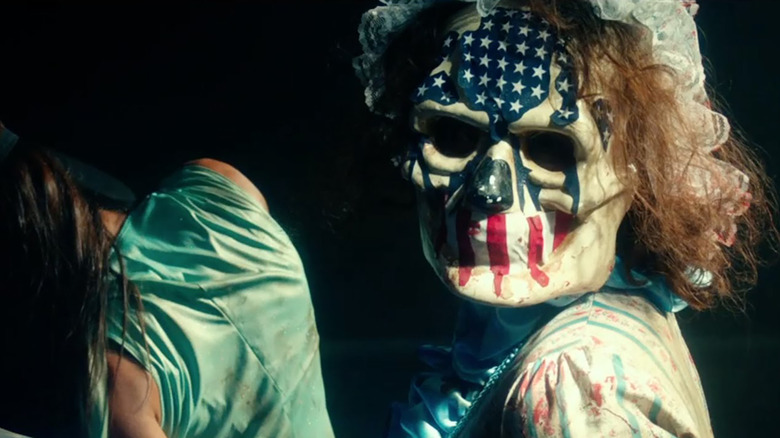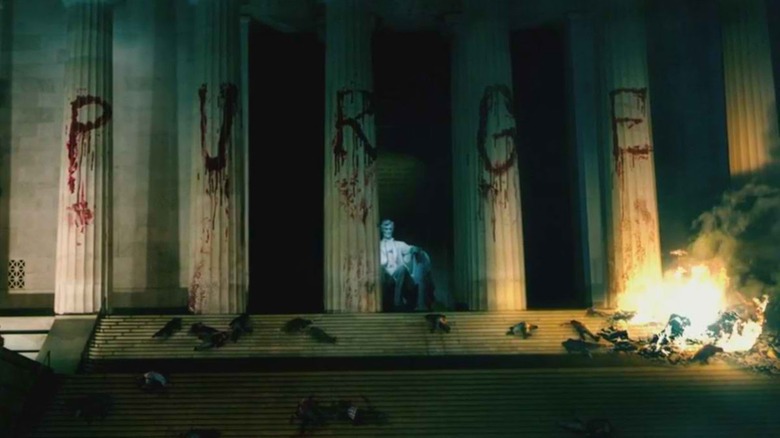The Purge Director Thinks Election Year Actually Took Things Too Far
James DeMonaco's 2013 dystopian horror film "The Purge" is a shabby affair, but possesses an intriguing premise: in the near future, the government has mandated that all crimes, including murder, are legal for a single night a year. The idea being that if everyone has a night to work out their darkest frustrations — to purge their evil — then they will be well-behaved the other 364 days out of the year. The wealthy tend to spend Purge Night locked away in their armored mansions, although in the first "Purge" movie, the bourgeois protagonists have their manse invaded regardless.
It wouldn't be until "The Purge: Anarchy" in 2014 that the political underpinnings of "The Purge" would become more explicit. That film takes place not in an opulent mansion, but among the impoverished, and how their small businesses — and very lives — are threatened by Purge Night. It seems the Purge was enacted as an explicit measure to murder the poor and people of color.
Then came the best film in the series, "The Purge: Election Year" which was released three months before Donald Trump was elected president. That film told its story from the perspective of revolutionaries who aimed to put a stop to the Purge, as well as the politicians who benefit from it. Its explicit politics and cynicism about the U.S. government leave "Election Year" as one of the most significant movies of its era; one might see it as the first Trump-era movie, even if it came before he was elected.
In a 2018 oral history printed in the Los Angeles Times, however, DeMonaco revealed that "Election Year" was his least favorite. The others, he felt, approached their class politics with a certain degree of finesse which "Election Year" lacked.
Not wanting to be too preachy
While "The Purge" movies are all explicitly political — indeed, all art is political — DeMonaco was concerned from tipping his violent dystopian thriller into the realm of the polemic. It's possible to go too far with political messaging, especially if a film devolves into mawkish speeches and extended asides wherein the character explain, in dialogue, what the movie is all about. A message is going to land harder if it's incorporated into the story more gracefully.
"Election Year" came right when America was feeling a little wary about the rise of Donald Trump's popularity, and sharply aware of his racism-laced word salads were being consumed by a bitter segment of the populace. Being subtle wasn't necessarily on everyone's minds. "Election Year" is happy to be a blunt, featuring scenes of criminals, dressed as American presidents, beating others senseless with baseball bats. DeMonaco, however, admits in retrospect that he didn't need to go that hard. He said:
"I think 'Purge 3' was the trickiest. 'Purge 2,' I talk to people, and it seems to be their favorite one, but 'Purge 3,' I looked at as a political conspiracy thriller, and I did not know if that would go over well with the audience. There's always the fear that we're preaching too much. I thought 3 actually pushed it too far into the political realm ... but that's the most successful one, so I was luckily wrong."
"Election Year" was made for $10 million and earned over $118 million worldwide. Clearly, DeMonaco was tapping into something, whether or not he felt he was being too political. Regardless, DeMonaco stepped away from directing for the next two entries in the series.
Trump and the New Founding Fathers
In the universe of "The Purge," the right-wing U.S. government has been supplanted by a jingoistic Christofascist cabal calling themselves the New Founding Fathers of America. The NFFA preaches purity and Christian togetherness, all while hoping for death and violence, supporting racism, and generally being hypocritical tyrants. DeMonaco admits that the NFFA, while initially an exaggerated sci-fi fantasy, eventually came to represent the then-rising Trump administration. DeMonaco wasn't trying to predict anything, but his bleak, dystopian nightmare appeared to be coming true. He said:
"He'd just gotten nominated, and we started to see a future of America that was oddly parallel to the NFFA that we were creating in the movie. We saw a parallel between the New Founding Fathers and the Trump administration and, specifically, the use of fear tactics to motivate. [...] Even the color of the dress we picked in one of the debate scenes mirrored the one that Hillary [Clinton] was wearing in her first debate with Trump. Everything was suddenly coming true, and I say that with no joy. When we start seeing these parallels, we were shocked."
DeMonaco didn't want to be a cinematic prophet of the age, but he kind of did by dint of his imagination. He later admitted that Purge Night was meant to be the darkest, worst idea imaginable and that its instigation was a sign of a world gone mad. By 2018, DeMonaco admitted, "I never would've said that I actually think the people in government would think it's a good idea." He then added bleakly: "I could not say the same today."


